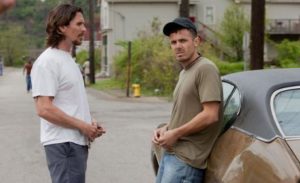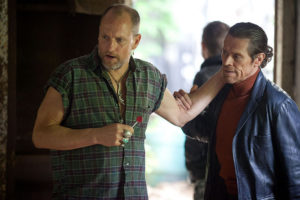Portraits of small town life in cinema are hit or miss. What “Out of the Furnace” does well, it does really well. Where it misses, it misses equally – frustrating as the film takes great pains to develop its characterization, and works hard in creating a top-notch atmosphere, score, and arena for its actors to shine. The film is not so much an action/revenge story, as its trailer would have you believe, but a foray into small, mill-town life that is stark, sharp, and unapologetic. That it loses something along the way in its plot is, however, ultimately forgivable given the movie’s greater whole.
“Out of the Furnace” is really a tale of two characters, Russell (Christian Bale) and Rodney (Casey Affleck), brothers whose run of bad luck is almost clinical. Rodney is always in trouble, losing money that he must pay back to the town gangster John Petty (Willem Dafoe), while Russell, after an accident on a lonely road, finds himself with jail time. At the same time, the brothers’ father is passing away from illness, painting a bleak environment for them to overcome. The film’s beginning also introduces us to the sinister Harlan DeGroat (Woody Harrelson in a very “Natural Born Killers”-like reprise), who is explained as a country gangster from the backwoods of New Jersey. However, these descriptions fail to convey the feeling “Out of the Furnace” portrays – the film is otherworldly, and feels every bit as much as stepping into another realm.
The film is a surprising effort by Director Scott Cooper (who also co-wrote the film), who comes off the heals of 2009’s “Crazy Heart,” known prior for taking the helm of 1999’s “Austin Powers: The Spy Who Shagged Me.” The film’s filmography is pristine, showing decrepit factories and trailer parks over dirt roads and blue-collar sweat. Russell works in “the mill;” David Gordon Green’s “All the Real Girls” showed factory-town life, but never life inside its mills. “Out of the Furnace” presents a picture of the life that exceeds mere visuals. Repaying debts, forging family bonds, and suffering for the next dollar are all presented here in its protagonists. Its characters have not but to live for but each other, even while strained relationships from past wounds threaten family ties. Even its villains are fearful of outsiders; Petty, kind in an odd way and familiar with his lot, speaks ill of New Jersey and the men who inhabit its sinister backwoods.
 The acting here is top notch, with special note to Bale and Harrelson, who own their characters with eerie precision. Bale is no stranger to powerhouse acting, giving equally impressive performances in films such as “American Psycho” and “Harsh Times.” Here, he submits another persuasive showing, filling out the blue-collar Russell with ease. Harrelson plays starkly opposite him, owning the villainous Harlan with near perfection. There is no trace of Harrelson’s other forays, such as the recent “The Hunger Games: Catching Fire” or the comedic “Kingpin;” Harlan is vicious, violent, and a force to be reckoned with. He certainly goes shot for shot with Bale, possibly even exceeding him for “Furnace’s” best actor.
The acting here is top notch, with special note to Bale and Harrelson, who own their characters with eerie precision. Bale is no stranger to powerhouse acting, giving equally impressive performances in films such as “American Psycho” and “Harsh Times.” Here, he submits another persuasive showing, filling out the blue-collar Russell with ease. Harrelson plays starkly opposite him, owning the villainous Harlan with near perfection. There is no trace of Harrelson’s other forays, such as the recent “The Hunger Games: Catching Fire” or the comedic “Kingpin;” Harlan is vicious, violent, and a force to be reckoned with. He certainly goes shot for shot with Bale, possibly even exceeding him for “Furnace’s” best actor.
Supporting characters such as Affleck and Dafoe are likewise engaging, and we see that both men are able to play starkly different roles when the situation calls for it. Dafoe has lost that insidious laugh of the Green Goblin in Sam Raimi’s “Spiderman,” and Affleck, known mostly for comedic roles, plays the part of a war veteran on tough times with deft and skill. Affleck might be the most refreshing part of the film, especially given the bond he forges with both Bale and Dafoe throughout.
The film suffers, regrettably, in its later acts, as it betrays the awesome atmosphere its beginning dredges up in favor of a darker ending than the film really needed. Additional characters also get lost in the shuffle, such as Forest Whittaker who plays a police chief and Zoë Saldana who plays one of the brother’s love interests. While intriguing throughout, “Furnace” shifts gears a bit too much toward drama and prolongation during its final act, taking away from the superb atmosphere and character development fostered during its beginning and middle.
 Not unforgivable by any means, “Out of the Furnace” presents a wonderful look at small-town life, and manages to immerse viewers completely in the experience. Wonderful acting, an engaging score, and a dark, haunting atmosphere make this a solid attempt. It’s ultimate criticism lies in the fact that it gets lost in plot and writing along the way instead growing its characters. The film ends by focusing on the dramatic; however, the simple may have brought an ultimately more lasting impression.
Not unforgivable by any means, “Out of the Furnace” presents a wonderful look at small-town life, and manages to immerse viewers completely in the experience. Wonderful acting, an engaging score, and a dark, haunting atmosphere make this a solid attempt. It’s ultimate criticism lies in the fact that it gets lost in plot and writing along the way instead growing its characters. The film ends by focusing on the dramatic; however, the simple may have brought an ultimately more lasting impression.
– by Mark Ziobro


